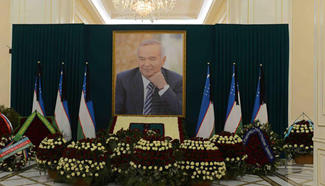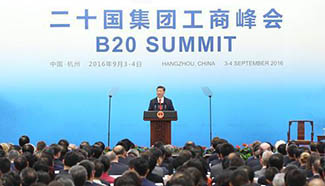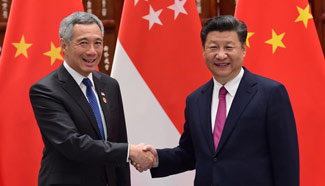VIENTTIANE, Sept. 4 (Xinhua) -- To upgrade the Free Trade area (FTA) between China and the Association of the Southeast Asian Nations (ASEAN) are in line with the common aspiration and practical need of both sides to deepen and expand cooperation in trade and economy, Chinese Ambassador to ASEAN Xu Bu said.
China and ASEAN agreed to upgrade the FTA in November 2015, China's first with foreign trading partners, after four rounds of talks that officially started in August 2014.
The move will not only forge closer economic and trade ties between the two sides, but also help realize the targets of scaling up two-way trade to 1 trillion U.S. dollars and two-way investment to 150 billion dollars by 2020 and promote the negotiations on the Regional Comprehensive Economic Partnership (RCEP), Xu said in an interview with Xinhua on the eve of the China-ASEAN summit to commemorate the 25th anniversary of the dialogue partnership between the two sides.
"It will speed up the economic integration and further liberalize and facilitate trade and investment in the region."
The Chinese ambassador said the negotiations on RCEP have been at the crucial stage.
"A total of 13 rounds of negotiations have been conducted and four meetings at the ministerial-level held so far, with the establishment of a related working group."
Progress has been made in the negotiations in the sectors such as trade in goods, trade in service, investment, economic and technical cooperation, intellectual property, competition policy, legislation and mechanism, Xu said.
China respects ASEAN's central role in the negotiations and is willing to work with it to press forward the negotiations and bridge differences between the two sides in a bid to conclude the negotiations within the year, he said.
RCEP is a proposed free trade agreement between the 10 member states of ASEAN and the six countries that have existing FTAs with the bloc, namely Australia, China, India, Japan, South Korea and New Zealand. ASEAN groups Brunei, Myanmar, Cambodia, Indonesia, Laos, Malaysia, the Philippines, Singapore, Thailand and Vietnam.
RCEP potentially includes more than 3 billion people or 45 percent of the world's population, and a combined GDP of about 21.3 trillion U.S. dollars, accounting for about 40 percent of world trade.
Once the agreement is nailed down, it will significantly optimize the production networks and value chains in the region and help Asia become a "world factory" in the world value chains.
"It will simplify the complicated trade ties among the Asian countries, eliminate trade barriers, promote trade and facilitate investment."
"RECP will also narrow the gap in development level and significantly promote the industrial upgrading of its members by opening up," Xu noted.
Speaking of cooperation in industrial capacity, the Chinese ambassador said it should be a priority for the two sides.
"Cooperation in industrial capacity will give new impetus to the development of both China and ASEAN. To achieve their respective development goals, both sides need to create new channels and break new grouds."
To further boost cooperation in industrial capacity, Xu said China and ASEAN should enhance synergy between their respective strategies and initiatives.
"China is willing to align its international industrial cooperation drive and the Belt and Road Initiative with the ASEAN Economic Community Blueprint 2025 and the Master Plan on ASEAN Connectivity, as well as development plans of respective ASEAN member states," Xu said.
China and ASEAN should also prioritize key sectors including iron and steel, cement, engineering, power and building materials to improve efficiency of their cooperation, he added.










